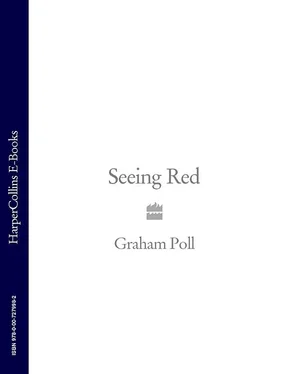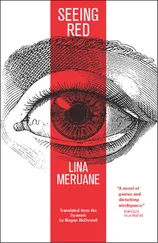1 ...7 8 9 11 12 13 ...18 I have told you all these arcane details to try to capture both the anticipation and frustration of waiting and hoping for an international appointment. It is all a bit cloak-and-dagger and if you make any assumptions about your own appointment, UEFA are likely to take the game away from you.
I waited impatiently for notification of game number 100. When it was announced, it was Seville – the match between two Spanish clubs, Sevilla and Osasuna. I am sure Bremen can be a lovely place, but I was very pleased by the news. Even if I had scripted it myself – setting out exactly how I wanted my one hundredth, and final, international match to unfold – I could not have improved on the actual events. Throughout this book I am trying to answer the question, ‘Why would anyone want to be a referee?’ The semi-final, second leg of the UEFA Cup provides one answer.
For Dutch referee Eric Braamhaar, the first leg did not go so well. He tore a calf muscle and there was a seven-minute delay before he was replaced by the fourth official. The only goal of the game was scored by Roberto Soldado of Osasuna, ten minutes into the second half.
I was at that dinner with Collina when the first leg was played, but I recorded the match and watched it when I arrived home in Tring, to pick up some pointers for the second leg. It was not difficult to glean what my game would be like because the theme of the first match was the mutual lack of respect between the two teams. The sub-plot was the frequency with which players went down unnecessarily, and stayed down, pretending to be hurt. I also saw Osasuna striker Savo Milosevic, the former Aston Villa player, appear to shove an opponent in the face out of sight of the referee. And at the finish there was a nasty mêlée. The second leg was going to be interesting then.
Peter Drury, the ITV commentator who was working at the first leg, lives in Berkhamsted, near Tring, and talked to me about some of the refereeing issues. He said, ‘I pity the poor so-and-so who has to referee the second leg.’
‘Thanks.’
He said, ‘It’s not you, is it?’
Knowing he could be trusted, I said, ‘Yup.’
My team for the second leg was Darren Cann and Roger East as assistants, with Mike Dean as fourth official. My other team was the family and friends who came to share my secret big occasion – Julia, my sister Susan, brother-in-law Tony, Rob Styles and Rob’s wife Liz. I told the assistants and fourth official that the reason for the suspiciously large contingent of family and friends was that it was game number 100.
In order for it to be a celebration, and not a wake, I had to have a decent match. The UEFA liaison officer warned us, ‘This is going to be a difficult game. These teams really don’t like each other.’ But I was up for it – I had ninety-nine international fixtures behind me and I had learned how to referee as a European instead of an Englishman. For example, on the Continent, when a player goes into a challenge with his studs showing, it is always a foul. In England, unless contact is made it is commonplace to play on.
Mind you, I had learned how to referee on the Continent the hard way – by being rubbish at one European game. That was another all-Spanish fixture, in November 1998: Real Sociedad versus Atletico Madrid in San Sebastián. I had a complete disaster, yet thought I had done well. I refereed as I would have done in England and ended up showing eleven yellows and two reds. But I was not in tune with Spanish football: the attitudes were different; the fouls were different. Consequently, the refereeing should have been different. I misread the game completely.
Spanish fans show their displeasure about refereeing decisions by waving white hankies. That night in San Sebastián there were 27,000 people in the stadium and probably 26,900 or so waved white hankies. The others must have forgotten theirs. It looked like a huge parachute had enveloped the stadium. We had to be smuggled out of the ground under a blanket that night.
That was in 1998. By May 2007 I was a better referee. But, because of the first leg, I was still anticipating that the second game would bring eight yellow cards at least and perhaps a couple of reds. On the morning of the match the representative of Sevilla came to me at the ground with a letter which did nothing to make me revise my forecast. The letter was written in English and couched in a very aggressive tone. It said, among other things, that Osasuna had disrupted the first leg by feigning injury and so Sevilla intended to ignore any apparent Osasuna injuries in the second leg. Sevilla would not kick the ball out and would not stop play if an Osasuna player was on the floor, looking injured. The letter asked me to tell Osasuna about Sevilla’s intention to play on. I was sure that if I read that letter out to Osasuna, it would only increase the enmity. Indeed, there might be some genuine injuries sustained before we even kicked off.
When the meeting with club representatives took place, without planning it in advance, I hit on the perfect thing to say. The Laws of the Game, I explained, made the safety of players the responsibility of the referee, not of the other players. I told the club representatives, truthfully, that in England we had adopted a new policy when players appeared injured. Neither side was expected to kick the ball out. Instead, the referee, and only the referee, decided when to stop play for an injury. I told the meeting that I intended to use that English policy.
Once the game kicked off, the first time someone went down and stayed down, I gave the free-kick but I stood over the player on the floor, smiled, offered him my hand for a handshake and pulled him up, still smiling. Players continued to hit the turf as if felled by snipers, but I repeated my performance three or four times: nice smile, handshake, pull him up.
I also completely discarded the diagonal system of refereeing – which I probably need to explain briefly here. The referee patrols the pitch in roughly a diagonal line. The two assistants patrol opposite halves of their touchline – from the goal-line to the halfway line. The idea is for the referee to keep the ball between him and one of the assistants.
The method of diagonal patrolling is used throughout football and I used it in most of my 1554 games – but not all of them. I discarded it if I thought I needed to keep closer to incidents and so I abandoned it that night because I was determined to keep on top of every incident. When I blew my whistle and the players looked around, I wanted to be only a few metres away.
My tactics meant a lot of running as well as a lot of smiling and a lot of shaking hands. I must have looked manic – but the approach worked. Players knew I was right behind them and they knew as well that I was giving fouls when appropriate. They realized I was not letting anyone stay down if he was not hurt, and so they soon stopped writhing about on the floor as if they had been the victims of heinous assaults.
I was totally on top of that game from start to finish. I let it flow, but I was utterly focused and completely ‘in the zone’ – as sportsmen and women from all sorts of disciplines say. In the entire ninety minutes, neither trainer came on once – not once.
Luis Fabiano scored for Sevilla from six yards after thirty-seven minutes to make the aggregate score 1–1 and we reached half-time without a single caution. The liaison officer was shocked but delighted. He called it an exceptional first half.
Dirnei Renato put Sevilla ahead with a clever, cushioned volley after fifty-three minutes, and although there was a tough period in the second half, when I had to take the names of five players in eleven minutes, the game needed those cautions. After I had administered them, it calmed down and flowed again.
Читать дальше












